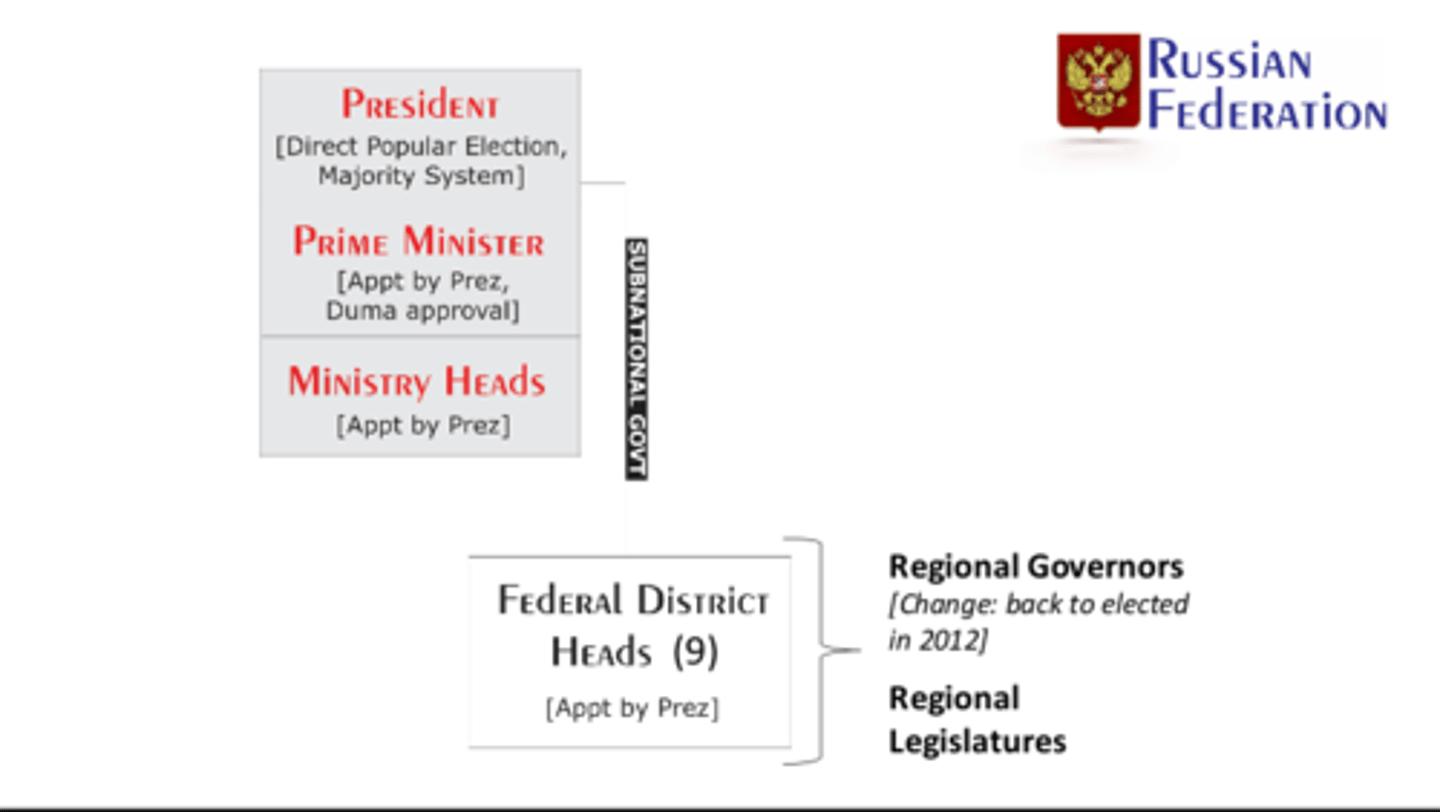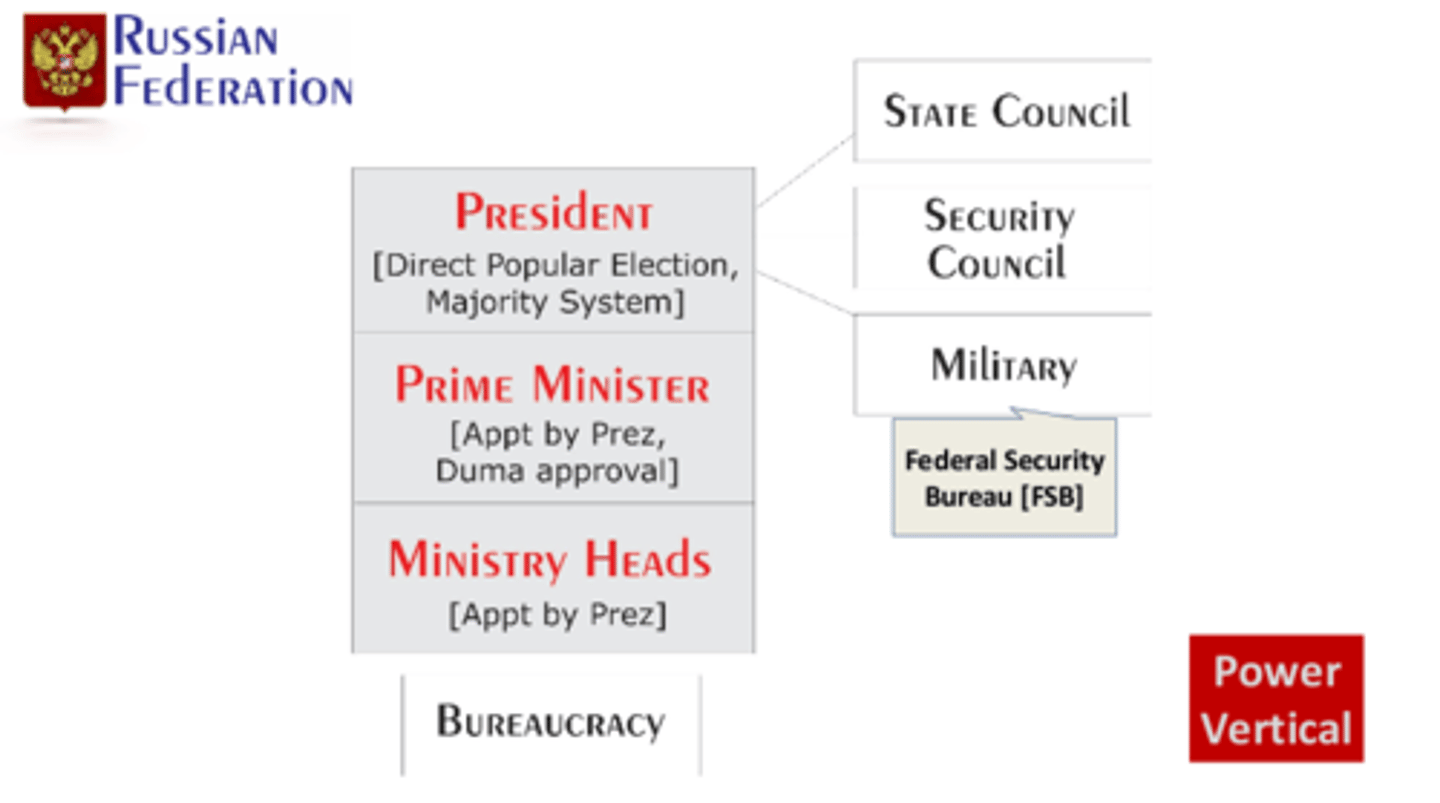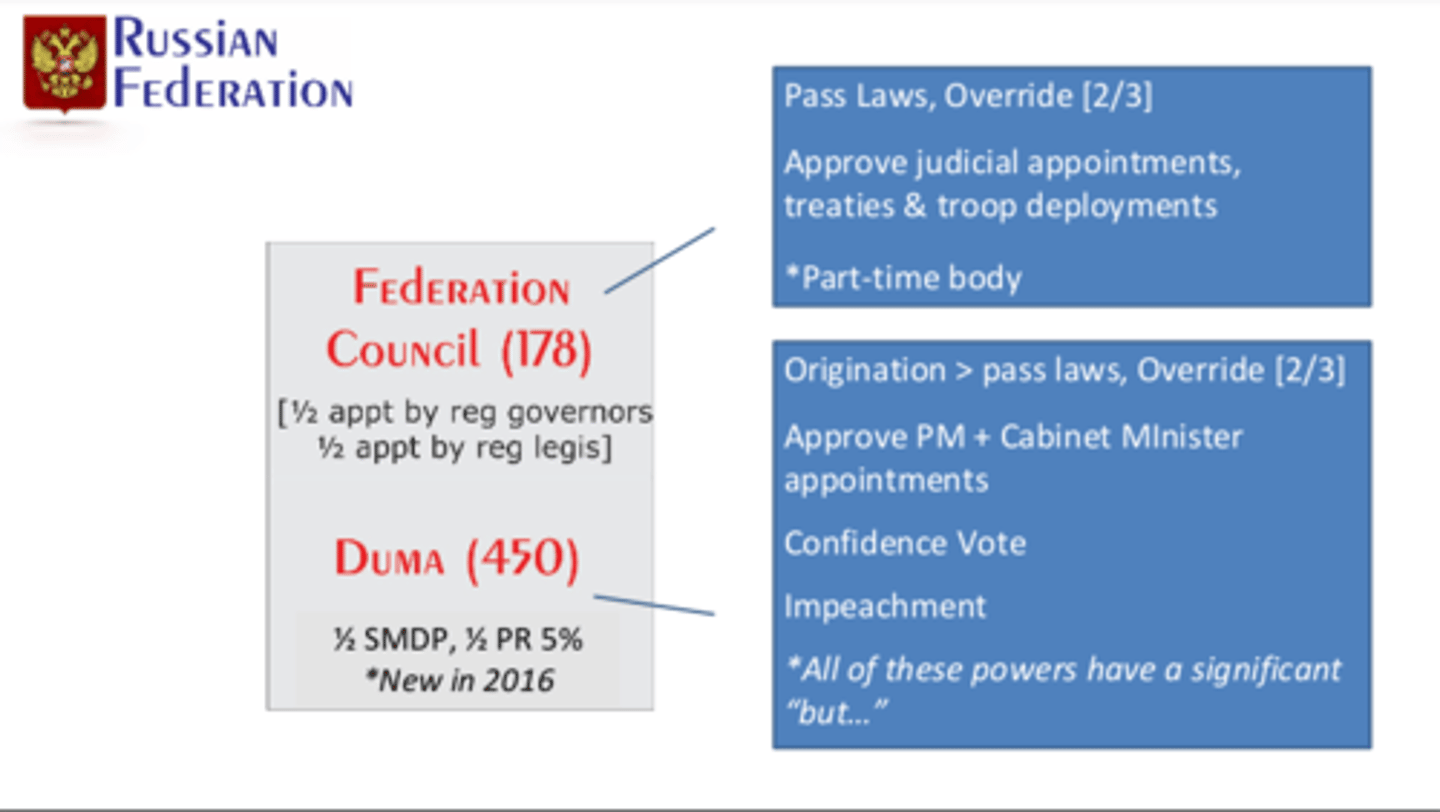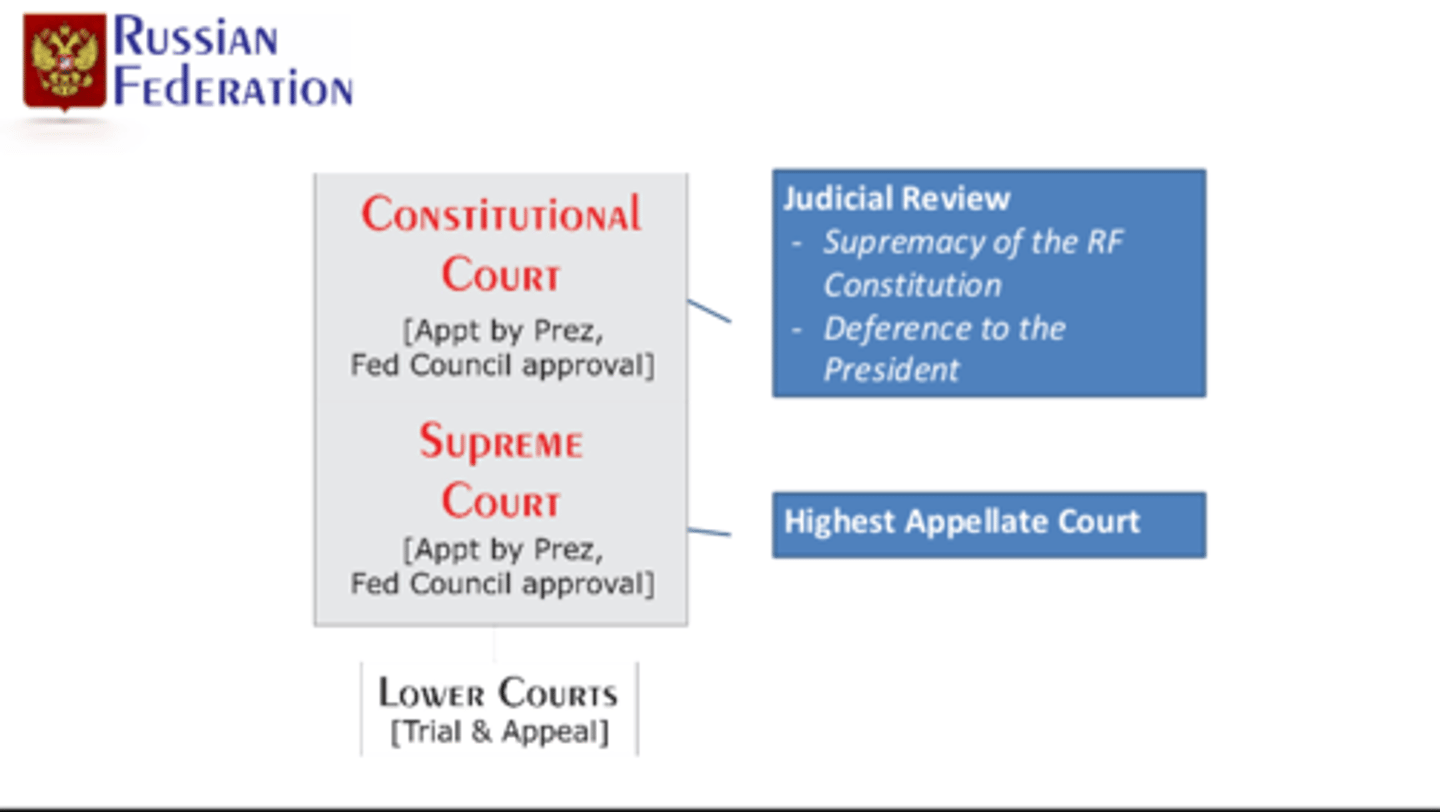COMP GOPO Unit 2B: Russia
1/36
There's no tags or description
Looks like no tags are added yet.
Name | Mastery | Learn | Test | Matching | Spaced |
|---|
No study sessions yet.
37 Terms
Federal Republic
Direct elections, presidential, three branches, separation of powers, federal (states)
Direct Elections
election of an official directly by the people rather than by an intermediary group such as the Electoral College
-in Russia, only the President is elected through this method (also the president is elected by majority)
presidential
a system of government in which the president is constitutionally independent of the legislature.
-Russia has a president (head of state)
Three Branches
Legislative, Executive, Judicial
Separation of Powers
the division of power among the legislative, executive, and judicial branches of government
Federal (states)
Constitutional practice in which subnational units are granted considerable power
-Russia has regional legislatures and regional governors (governors are elected)
-Russia has 83 "federal subjects"

Democratization and its impact on power, authority and legitimacy:
Monarchy to Communist Revolution to the USSR to democracy to Putin's authoritarianism, "managed democracy," rigged elections, state media control
Monarchy
-Tsars=absolute monarchs
-No reformation due to Orthodox Church dominating Russia (church also had strong ties to autocracy)
-Western trends didn't have an impact in Russia
-Periods of reform did happen, but there were also slavophiles (people who believed that Russian traditions were superior to anything in the West and wanted to keep foreign influence out)
-Russia lagged behind the West and lost wars to it (e.g. Crimean War of 1854-55)
-WW1=caused collapse of monarchy
Communist Revolution
A political revolution in Russia beginning in 1917. The Bolsheviks, now known as Communists, overthrew Czar Nicholas II and created a socialist government based upon the writings of Karl Marx and Vladimir Lenin. Also know as the Bolshevik Revolution.
USSR
-Bolsheviks won in 1923; ended revolution
-Stalin turned USSR into totalitarian state (e.g. used purges [the systematic removal of people from a party, states or other office; especially common in communist systems], executions, and prisons [gulag]), but also industrialized the country and turned it into one of the two superpowers after WW2 by sending farmers to gigantic collective farms and the rest of the peasants to cities to work in factories
-Stalin introduced 5-year plans (in the former USSR and other communist countries, the period for which Gosplan developed goals and quotas) (Gosplan=the Soviet central planning agency)
-Khrushchev=reformer and leader after Stalin and criticized Stalin (his secret speech), decentralized economic decision-making, revitalized agricultural sector, relaxed tensions with US, but then social and economic problems grew (as well as political opposition); he was dismissed as General Secretary after the Cuban Missile Crisis (Cuban Missile Crisis=seen as humiliating defeat for USSR)
-Brezhnev=ended reforms, took fewer roles in domestic and foreign affairs, economic problems in USSR grew, introduced limited economic reforms (that would threaten 2 of the USSR's central principles: the party's monopoly on political power and the centrally controlled economy)
-Gorbachev=realized USSR needed change; created 4 sets of reform that never passed and actually polarized the elite and the country; USSR needed a set of similar values so that it would be more innovative and take more economic risks; introduced Glasnost (Soviet policies that opened up the political system and allowed for freedom of expression) (actually didn't create a tolerant, Western-style political culture; it instead allowed people to vent 70 years worth of frustration), reformers realized that democracy was needed for Glasnost to
USSR Political Institutions
-Party Congress=most important in principle but in practice was the least influential (normally held every 4 years)
-Central committee: supposedly the most important body in a communist party; its influence declined as it grew in size and the party needed daily leadership
-Power concentrated in 2 groups that the central committee officially appointed (but were self-perpetuating): politburo (12-14 members with another 5-6 non-voting candidates [acted like a cabinet in a parliamentary system]) and secretariat (~25 members and a staff of 1500=oversaw party apparatus)
-Politburo and secretariat had considerable overlap in membership
-General secretariat-head of the Secretariat and chair of the politburo
-Politburo=generic term used to describe the leadership of communist parties
-Secretariat=generic term used to denote the bureaucratic leaders of a communist party
-Democratic centralism (The Leninist organizational structure that concentrates power in the hands of the party elite [also allowed for discussion before a decision was made; after the decision was made, everyone had to follow it no matter what]) allowed leaders at one level to determine the leaders at the level below them
-Control over entire organization was exercised through the nonmenklatura lists of important positions and people qualified to fill them (both of which were maintained by the Secretariat)
-Leadership maintained total control over who was appointed to official positions and, therefore, also over the decisions it cared most about
-Nonmenklatura: the soviet system of lists that facilitated the CPSU's appointment of trusted people to key positions, adopted by other communist regimes
Democratization of Russia
-June 12, 1991=Boris Yeltsin elected prez of Russian Republic
-5 days later=KGB warned people to not come up with liberal reforms
-July 24=Gorbachev reached agreement with 10 out of 15 Republic presidents that would give them considerable autonomy in most areas of policymaking
-August 19, 1991=Gorbachev was ill and replaced by President Gennadi Yanagev (who seized power along with 7 other hard-liners) (Gorbachev and his family were taken into custody and military troops took critical positions in cities)
-Yeltsin opposed coup (people who started coup=poorly organized and worried over the end of the USSR)
-Union treaty was put on hold as the USSR began to disintegrate and republics broke away
-End of December=Gorbachev resigned from position as a president of a country that no longer existed
Putin's Authoritarianism
Putin has some aspects of authoritarianism, because he continues to get elected, he controls the media, and he has been known to throw people who oppose him in jail
"Managed Democracy"
Managed democracy controls society while providing the appearance of democracy. Its main characteristics are as follows:
1. A strong presidency and weak institutions
2. State control of the media
3. Control over elections allows elites to legitimize their decisions
4. Visible short-term effectiveness and long-term inefficiency
The result is an "unstable stability" based on the president's personality. He is actually a hostage of the system.
This system is highly dysfunctional, with poor information flows. Everything beneath the president is vertically integrated, but there are no horizontal connections
As for the electoral system, it's not that bad—it's worse. The center can legally exclude any candidate
For now, the lack of meaningful elections has seriously weakened civil society.
In conclusion, the system is bad, not only for democracy, but for effectiveness
Rigged Elections
when voting is manipulated to have a desired outcome
State Media Control
Russia's President Vladimir Putin has gradually reasserted state control over his country's major media companies. And now he has signed into law a measure criminalizing reporting that contradicts the government's version of events
The top national TV networks are either state-run or owned by companies with close links to the Kremlin
News and current affairs shows on mainstream TV are dominated by pro-Kremlin messages and denigration of the West.
Executive
Semi-presidential, term limits, dual executive, cabinet
-President: directly elected head of state, appointment/removal, veto, foreign policy chief, commander-in-chief
-Prime Minister: appointed/confirmed head of government, oversees bureaucracy/implementation of laws

Semi-presidential
political system with a directly elected president and a government headed by a prime minister who is responsible to an elected parliament
Term Limits for Russian president and prime minister
The president is elected directly through a popular vote to a six-year term. Previously, the Constitution established term limit for the presidency restricting the officeholder to serve no more than two terms. However, this limitation has since been overhauled in large part due to the constitutional amendments that were ratified in 2020
Russian president=Russian President Vladimir Putin has signed a law paving the way for him to run for two more presidential terms (these laws pretty much said that his first two terms as President were nulled and he now had a fresh start and could run two more times)
A term limit was introduced after the creation of the post of the president of Russia. Government became subordinate to the president, so the prime minister must resign along with the president, but may be appointed again. From 1991 to 1996, the maximum term of office of the prime minister was 5 years. After the new Constitution of Russia was created, the term of office of the president, and therefore the term of office of the prime minister, was shortened to 4 years. In 2012, after amendments to the Constitution the term of the president and prime minister was increased to 6 years.
Dual Executive
President is the head of state while the prime minister is the head of government
President - directly elected head of state
The president is elected directly through a popular vote to a six-year term
-Head of state=ceremonial roles+military leader
President - foreign policy chief
President can negotiate treaties with foreign countries
-The president determines Russia's position in international affairs, along with the prime minister and the government of the federation, and represents the state in international relations, conducts negotiations and signs ratification documents. The president appoints and recalls diplomatic representatives of Russia to foreign states and international organizations. These appointments are preceded by consultations with the respective committees or commissions of the two houses of the Federal Assembly. The president signs international treaties.
Total presidential powers:
Head of state
-Legislative powers: introduce legislation, veto, rule by decree (rule by decree is very important compared to the other countries since it's practically impossible for the legislation to create legislation since the federal council rarely meets)
-Executive powers: appoint and remove PM and "power ministers", commander-in-chief
-Judicial powers: appointment (however the Federation Council must approve)
Prime Minister - appointed/confirmed head of government
Prime Minister is appointed by the president and approved by the Duma
Prime Minister - oversees bureaucracy/implementation of laws
Because the Prime Minister is the head of government, he or she is responsible for the bureaucracy and the bureaucracy is responsible for implementing laws (so the PM determines implementation of laws)
Other Prime Minister powers/duties
-Economic and social policy
-"legislative floor leader"--makes sure Putin's laws are passed
Legislature
Bicameral parliamentary-hybrid
-Duma: approves legislation, confirms PM/cabinet
-Federation Council: approves budget, treaties, judicial nominations, troop deployment

Parliamentary-hybrid
term that describes Russia's semi-presidential system in which a directly elected president appoints the prime minister of the national legislature's lower chamber (Duma)
Duma's Powers
-Origination of laws and pass laws; override (2/3)
-Approve PM+Cabinet minister appointments
-Confidence vote, impeachment (confidence vote=prez must allow it, prez can ignore twice, 3rd time=PM removed but every Duma member is up for election) (impeachment must be approved by Federation council and supreme court; this makes impeaching the president very hard)
*All of these powers have a significant but
Federation Council's Powers
-Pass laws, override (2/3)
-Approve budget, judicial appointments, treaties, and troop deployments
*Part time body (only meets twice a month) (due to meeting twice a month it's hard for legislature to pass legislation, so prez must rule by decree)
How the Duma is elected (Lower House)
1/2 SMDP, 1/2 proportional representation 5% (New in 2016)
How is the Federation Council chosen (Upper House)
1/2 appointed by regional governors, 1/2 appointed by regional legislature
Judiciary
Rule by law, judicial review (constitutionally), nominated by President/approved by FC

Rule by Law
Government uses law to control and govern
2 parts of Russia's judiciary:
Constitutional Court and Supreme Court
Constitutional Court
-Handles constitutional issues
-Judicial review
-Supremacy of the RF constitution (e.g. supremacy clause)
-Deference to the President
Supreme Court
-Handles everything else BUT constitutional issues
-Highest appellate court